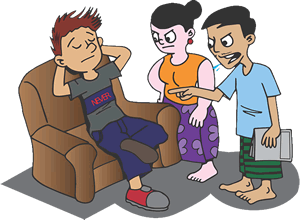
As a teacher it’s incredibly difficult to address bullying in the classroom – especially in it’s more subtle forms. You can’t be there every time a mean comment is made, and you can’t force students to include each other at lunchtime or on social media. But there are some simple things you CAN do that make a huge difference for your students. ONE OF THE BIG MYTHS ABOUT BULLYING IS THE ASSUMPTION THAT THE BULLY IS THE ONE WITH ALL THE POWER. Because of this myth, kids and teens who are victimised usually think there is nothing they can do until the bullying stops. But they couldn’t be more wrong. And as a teacher, you can help your students figure this out faster than they ever could on their own. Ultimately, we want students to learn that they can ignore people who are being unkind. But telling a child or teenager to simply disregard the words of peers who they perceive to be stronger, cooler, or “better” is often too big of an ask. FIRST, WE NEED TO HELP THEM PROCESS WHAT THEY ARE GOING THROUGH AND BUILD THEMSELVES UP TO THE POINT THAT THEY ARE ABLE TO TAKE THIS STEP. Here are some simple things you can do that will help get them there: 1 – Take the student aside and let them know you see what they are going through and how hard it is – just knowing that their pain is noticed will go a long way. 2 – Tell them about a time that you felt left out or picked on and how it made you feel to normalise their experience. Hearing that other people feel the way they do is often big news to students, and can have a huge impact in helping them relate to their feelings. 3 – Tell them “What other people do is about their own pain and has nothing to do with you”. I like to give the analogy that when hard things happen in life, it’s as if we end up with garbage inside of us and some people don’t know where to put that garbage and so they dump it onto others. 4 – Ask them what THEY can do to change or cope with the dynamic. Using the previous analogy, I often tell students that even if people are dumping on us, it’s up to US to choose if we want to take on that garbage or not. Reminding kids
of their own power helps them learn and grow from whatever they are
experiencing rather than remaining a victim to it. Part of the change you want to
encourage them to make will be to find new friends or people to hang out with
who truly see and appreciate them.
5 – Once they have this peer support and are reminded of their own worth, THEN
you can help them reflect that they can choose to focus on people who build
them up rather than the ones who cut them down.
When students are given this perspective and reminded that they have a CHOICE,
there is no end to the way they can transform their lives and their feelings about
themselves, no matter what they have been through.


